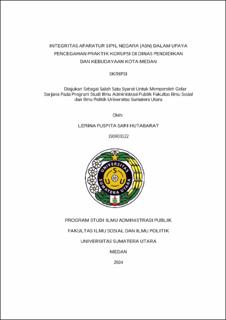| dc.description.abstract | The integrity of civil servants (ASN) is the fundamental basis for creating good governance, ensuring the administration is conducted professionally, transparently, responsibly, and fairly. The goal is to establish a government free from corruption, collusion, and nepotism (KKN). Despite bureaucratic reforms, corruption remains a serious issue in government institutions, especially in the education sector, which should be a source of knowledge for the nation. Corruption cases in Medan City, particularly in the Department of Education and Culture, reveal weaknesses in the supervision and prevention systems. This study aims to describe and analyze the integrity of ASN in efforts to prevent corruption practices in the Department of Education and Culture of Medan City.
This research was conducted using a descriptive method with a qualitative approach. Data collection techniques included interviews, observations, and documentation carried out at the Medan City Department of Education. Data analysis used Abdullah's Integrity Theory with four variables: honest behavior, consistent attitude, courage in decision-making, and readiness to take risks and be responsible.
The results showed that the integrity of ASN in the Department of Education and Culture of Medan City is reflected through honest behavior in providing correct guidance and rejecting bribes. Efforts to prevent corruption are implemented through an online complaint channel. The consistency of ASN is seen in their discipline regarding working hours and task procedures, although there are still instances of indiscipline, such as tardiness and non-compliance with attendance rules. The courage of leaders in making decisions demonstrates firmness, despite electoral neutrality violations testing their integrity. Additionally, the readiness to take risks and responsibility in providing quality services remains a focus. This highlights the need for training and fostering an anti-corruption culture among ASN in this department. | en_US |


